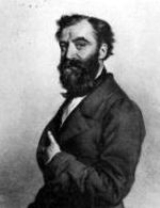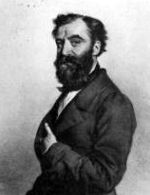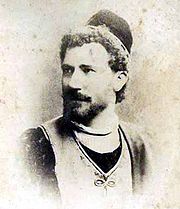
Le duc d'Albe
Encyclopedia
Le duc d'Albe or Il duca d'Alba (The Duke of Alba) is an opera
in three acts originally composed by Gaetano Donizetti
in 1839 to a French
language libretto
by Eugène Scribe
and Charles Duveyrier. The score, left unfinished by Donizetti, was completed by his former pupil Matteo Salvi
and the opera received its first performance at the Teatro Apollo in Rome on 22 March 1882, more than 40 years after Donizetti's death.
 The opera had been originally commissioned for the Paris Opéra
The opera had been originally commissioned for the Paris Opéra
in 1839, and Donizetti worked on it throughout most of that year. However, he abandoned the project with only the first two acts completed, plus notes for the melodies and bass lines for Acts 3 and 4. The opera remained unfinished at the time of his death in 1848. In 1855, Scribe and Duveyrier's libretto was transferred to Verdi's opera Les vêpres siciliennes
, with the setting changed from the Spanish occupation of Flanders
in 1573 to the French occupation of Sicily
in 1282.
In 1881 Matteo Salvi
, a former pupil of Donizetti's, completed the opera from Donizetti's notes with the help of Amilcare Ponchielli
, Antonio Bazzini
and Cesare Domeniceti. Angelo Zanardini translated Scribe's libretto from the original French into Italian, and the names of the two lovers, 'Henri' and 'Hélène', which by that time had been used in Les vêpres siciliennes
were changed to 'Marcello' and 'Amelia'. When Donizetti abandoned the opera, he re-cycled the famous tenor aria, 'Ange si pur' (or 'Spirto gentil' in the Italian version) for his 1840 opera La favorite
. For the premiere, Salvi composed a replacement aria, 'Angelo casto e bel'. He also added recitatives and combined Acts III and IV into a single final act.
The opera received its first performance in 1882 as Il duca d'Alba (the title used in all its subsequent performances) with Leone Giraldoni in the title role, Abigaille Bruschi Chiatti as Amelia di Egmont, and Julián Gayarre
as Marcello.
in Spoleto, when the conductor Thomas Schippers
, reworked the score, removing most of Salvi's additions and reconstructing the final acts himself from Donizetti's notes. Schippers also returned 'Spirto Gentil' to its original place in the opera. The Spoleto production was directed by Luchino Visconti
who used restored sets from the 1882 premiere. Schippers presented the United States premiere of the work later that year under the umbrella of the American Opera Society
at the Academy of Music
in Philadelphia on October 15, 1959. The Schippers version with the Visconti production was revived at the 1992 Spoleto Festival USA
in Charleston, South Carolina.

to suppress the rebellion against Spanish rule. Shortly before the action begins, Amelia's father Egmont, a Flemish hero, had been executed by the Duke and she is now determined to assassinate him. The Duke discovers that his long-lost son Marcello, Amelia's lover, is now the leader of the rebellion. The Duke arrests him when he refuses to join the Spanish army.
Opera
Opera is an art form in which singers and musicians perform a dramatic work combining text and musical score, usually in a theatrical setting. Opera incorporates many of the elements of spoken theatre, such as acting, scenery, and costumes and sometimes includes dance...
in three acts originally composed by Gaetano Donizetti
Gaetano Donizetti
Domenico Gaetano Maria Donizetti was an Italian composer from Bergamo, Lombardy. His best-known works are the operas L'elisir d'amore , Lucia di Lammermoor , and Don Pasquale , all in Italian, and the French operas La favorite and La fille du régiment...
in 1839 to a French
France
The French Republic , The French Republic , The French Republic , (commonly known as France , is a unitary semi-presidential republic in Western Europe with several overseas territories and islands located on other continents and in the Indian, Pacific, and Atlantic oceans. Metropolitan France...
language libretto
Libretto
A libretto is the text used in an extended musical work such as an opera, operetta, masque, oratorio, cantata, or musical. The term "libretto" is also sometimes used to refer to the text of major liturgical works, such as mass, requiem, and sacred cantata, or even the story line of a...
by Eugène Scribe
Eugène Scribe
Augustin Eugène Scribe , was a French dramatist and librettist. He is best known for the perfection of the so-called "well-made play" . This dramatic formula was a mainstay of popular theater for over 100 years.-Biography:...
and Charles Duveyrier. The score, left unfinished by Donizetti, was completed by his former pupil Matteo Salvi
Matteo Salvi
Matteo Salvi was a composer of opera and classical music and a theatre director.Salvi was born in Botta di Sedrina , Italy...
and the opera received its first performance at the Teatro Apollo in Rome on 22 March 1882, more than 40 years after Donizetti's death.
Composition history

Académie Royale de Musique
The Salle Le Peletier was the home of the Paris Opera from 1821 until the building was destroyed by fire in 1873. The theatre was designed and constructed by the architect François Debret on the site of the former Hôtel de Choiseul...
in 1839, and Donizetti worked on it throughout most of that year. However, he abandoned the project with only the first two acts completed, plus notes for the melodies and bass lines for Acts 3 and 4. The opera remained unfinished at the time of his death in 1848. In 1855, Scribe and Duveyrier's libretto was transferred to Verdi's opera Les vêpres siciliennes
Les vêpres siciliennes
Les vêpres siciliennes is an opéra in five acts by the Italian romantic composer Giuseppe Verdi set to a French libretto by Charles Duveyrier and Eugène Scribe from their work Le duc d'Albe, which was written in 1838 and offered to Halevy and Donizetti before Verdi...
, with the setting changed from the Spanish occupation of Flanders
Flanders
Flanders is the community of the Flemings but also one of the institutions in Belgium, and a geographical region located in parts of present-day Belgium, France and the Netherlands. "Flanders" can also refer to the northern part of Belgium that contains Brussels, Bruges, Ghent and Antwerp...
in 1573 to the French occupation of Sicily
Sicily
Sicily is a region of Italy, and is the largest island in the Mediterranean Sea. Along with the surrounding minor islands, it constitutes an autonomous region of Italy, the Regione Autonoma Siciliana Sicily has a rich and unique culture, especially with regard to the arts, music, literature,...
in 1282.
In 1881 Matteo Salvi
Matteo Salvi
Matteo Salvi was a composer of opera and classical music and a theatre director.Salvi was born in Botta di Sedrina , Italy...
, a former pupil of Donizetti's, completed the opera from Donizetti's notes with the help of Amilcare Ponchielli
Amilcare Ponchielli
Amilcare Ponchielli was an Italian composer, largely of operas.-Biography:Born in Paderno Fasolaro, now Paderno Ponchielli, near Cremona, Ponchielli won a scholarship at the age of nine to study music at the Milan Conservatory, writing his first symphony by the time he was ten years old.Two years...
, Antonio Bazzini
Antonio Bazzini
Antonio Joseph Bazzini was an Italian violinist, composer and teacher. As a composer his most enduring work is his chamber music which has earned him a central place in the Italian instrumental renaissance of the 19th century...
and Cesare Domeniceti. Angelo Zanardini translated Scribe's libretto from the original French into Italian, and the names of the two lovers, 'Henri' and 'Hélène', which by that time had been used in Les vêpres siciliennes
Les vêpres siciliennes
Les vêpres siciliennes is an opéra in five acts by the Italian romantic composer Giuseppe Verdi set to a French libretto by Charles Duveyrier and Eugène Scribe from their work Le duc d'Albe, which was written in 1838 and offered to Halevy and Donizetti before Verdi...
were changed to 'Marcello' and 'Amelia'. When Donizetti abandoned the opera, he re-cycled the famous tenor aria, 'Ange si pur' (or 'Spirto gentil' in the Italian version) for his 1840 opera La favorite
La favorite
La favorite is an opera in four acts by Gaetano Donizetti to a French-language libretto by Alphonse Royer and Gustave Vaëz, based on the play Le comte de Comminges by Baculard d'Arnaud...
. For the premiere, Salvi composed a replacement aria, 'Angelo casto e bel'. He also added recitatives and combined Acts III and IV into a single final act.
The opera received its first performance in 1882 as Il duca d'Alba (the title used in all its subsequent performances) with Leone Giraldoni in the title role, Abigaille Bruschi Chiatti as Amelia di Egmont, and Julián Gayarre
Julián Gayarre
Sebastián Julián Gayarre Garjón , better known as Julián Gayarre, was a Spanish opera singer who created the role of Marcello in Donizetti's Il Duca d'Alba and Enzo in Ponchielli's La Gioconda.Although he faced strong competition for this title from the likes of Roberto Stagno, Italo Campanini,...
as Marcello.
Performance history
The opera has only been rarely performed since 1882. However, there was a major revival at the 1959 Festival dei Due MondiFestival dei Due Mondi
The Festival dei Due Mondi ' is an annual summer music and opera festival held each June to early July in Spoleto, Italy, since its founding by composer Gian Carlo Menotti in 1958...
in Spoleto, when the conductor Thomas Schippers
Thomas Schippers
Thomas Schippers was an American conductor. He was highly-regarded for his work in opera.-Biography:...
, reworked the score, removing most of Salvi's additions and reconstructing the final acts himself from Donizetti's notes. Schippers also returned 'Spirto Gentil' to its original place in the opera. The Spoleto production was directed by Luchino Visconti
Luchino Visconti
Luchino Visconti di Modrone, Count of Lonate Pozzolo was an Italian theatre, opera and cinema director, as well as a screenwriter. He is best known for his films The Leopard and Death in Venice .-Life:...
who used restored sets from the 1882 premiere. Schippers presented the United States premiere of the work later that year under the umbrella of the American Opera Society
American Opera Society
The American Opera Society was a New York City based musical organization that presented concert and semi-staged performances of operas between 1951 and 1970...
at the Academy of Music
Academy of Music (Philadelphia)
The Academy of Music, also known as American Academy of Music, is a concert hall and opera house located at Broad and Locust Streets in Philadelphia, Pennsylvania. It was built in 1857 and is the oldest opera house in the United States that is still used for its original purpose...
in Philadelphia on October 15, 1959. The Schippers version with the Visconti production was revived at the 1992 Spoleto Festival USA
Spoleto Festival USA
Spoleto Festival USA in Charleston, South Carolina, is one of the world's major performing arts festivals. It was founded in 1977 by Pulitzer Prize-winning composer Gian Carlo Menotti, who sought to establish a counterpart to the Festival dei Due Mondi in Spoleto, Italy...
in Charleston, South Carolina.
Roles

| Role | Voice type | Premiere Cast, 22 March 1882 (Conductor: Marino Mancinelli) |
|---|---|---|
| Il duca d’Alba, Governor of Flanders for King Philip II of Spain | baritone Baritone Baritone is a type of male singing voice that lies between the bass and tenor voices. It is the most common male voice. Originally from the Greek , meaning deep sounding, music for this voice is typically written in the range from the second F below middle C to the F above middle C Baritone (or... |
Leone Giraldoni Leone Giraldoni Leone Giraldoni was a celebrated Italian operatic baritone. He created the title roles of Gaetano Donizetti's Il duca d'Alba and Verdi's Simon Boccanegra as well as the role of Renato in Verdi's Un ballo in maschera .Giraldoni studied in Florence with Luigi Ronzi and made his début as the High... |
| Amelia di Egmont | soprano Soprano A soprano is a voice type with a vocal range from approximately middle C to "high A" in choral music, or to "soprano C" or higher in operatic music. In four-part chorale style harmony, the soprano takes the highest part, which usually encompasses the melody... |
Abigaille Bruschi Chiatti |
| Marcello di Bruges, a Flemish patriot and Amelia's lover | tenor Tenor The tenor is a type of male singing voice and is the highest male voice within the modal register. The typical tenor voice lies between C3, the C one octave below middle C, to the A above middle C in choral music, and up to high C in solo work. The low extreme for tenors is roughly B2... |
Julián Gayarre Julián Gayarre Sebastián Julián Gayarre Garjón , better known as Julián Gayarre, was a Spanish opera singer who created the role of Marcello in Donizetti's Il Duca d'Alba and Enzo in Ponchielli's La Gioconda.Although he faced strong competition for this title from the likes of Roberto Stagno, Italo Campanini,... |
| Sandoval, Captain of the Spanish troops | baritone | Hjalmar Frey |
| Carlo, a Spanish officer | tenor | Giovanni Paroli |
| Daniele Brauer, a Flemish patriot | baritone Baritone Baritone is a type of male singing voice that lies between the bass and tenor voices. It is the most common male voice. Originally from the Greek , meaning deep sounding, music for this voice is typically written in the range from the second F below middle C to the F above middle C Baritone (or... |
Alessandro Silvestri |
| Il taverniere, a beer seller | bass | Romeo Sartori |
Act 1
The Duke of Alba has been sent to FlandersFlanders
Flanders is the community of the Flemings but also one of the institutions in Belgium, and a geographical region located in parts of present-day Belgium, France and the Netherlands. "Flanders" can also refer to the northern part of Belgium that contains Brussels, Bruges, Ghent and Antwerp...
to suppress the rebellion against Spanish rule. Shortly before the action begins, Amelia's father Egmont, a Flemish hero, had been executed by the Duke and she is now determined to assassinate him. The Duke discovers that his long-lost son Marcello, Amelia's lover, is now the leader of the rebellion. The Duke arrests him when he refuses to join the Spanish army.
Act 2
When Marcello is freed from prison, he appeals to the Duke to spare his co-conspirators and Amelia, all of whom have been arrested in Daniele Bauer's tavern. The Duke reveals to Marcello that he is his father. In exchange for his friends' freedom, Marcello kneels before the Duke and acknowledges him as his father.Act 3
Marcello confesses to Amelia that he is the Duke's son. She asks him to kill the Duke as proof of his love for her. Torn between his father and the woman he loves, Marcello hesitates. Later at the port of Antwerp, Amelia, disguised as a man, takes matters into her own hands and attempts to stab the Duke to death. Marcello throws himself on the Duke to shield him and is unwittingly killed by Amelia.Recordings
| Year | Cast (Il duca d'Alba, Marcello di Bruges, Amelia di Egmont) |
Conductor, Opera House and Orchestra |
Label |
|---|---|---|---|
| 1951 | Giangiacomo Guelfi Giangiacomo Guelfi Giangiacomo Guelfi is an operatic baritone, particularly associated with Verdi and Puccini. Born in Rome, he studied law before turning to vocal studies, in Florence, with the great baritone Titta Ruffo. Giangiacomo made his stage debut in Spoleto, as Rigoletto in 1950... , Amedeo Berdini, Caterina Mancini Caterina Mancini Caterina Mancini is an Italian dramatic coloratura soprano, primarily active in Italy in the 1950s.Mancini was born at Genzano di Roma. She made her debut in 1948, as Giselda in I Lombardi, in Florence... |
Fernando Previtali Fernando Previtali Fernando Previtali was an Italian conductor, particularly associated with the Italian repertory, especially Verdi operas.... Orchestra sinfonica della RAI di Roma |
Audio CD: Bongiovanni Historical Opera Collection Cat: HOC015-16 |
| 1959 | Louis Quilico Louis Quilico Louis Quilico, CC was a Canadian opera singer. One of the leading dramatic baritones of his day, he was an ideal interpreter of the great Italian and French composers, especially Giuseppe Verdi. He was often referred to as "Mr Rigoletto" in reference to the Verdi opera... , Renato Cioni Renato Cioni Renato Cioni is an Italian operatictenor, particularly associated with the Italian repertory.Born on the Isle of Elba, the son of a fisherman, Cioni received his main musical education at the Cherubini Conservatory in Florence... , Ivana Tosini |
Thomas Schippers Thomas Schippers Thomas Schippers was an American conductor. He was highly-regarded for his work in opera.-Biography:... Trieste Philharmonic Orchestra and Teatro Lirico Giuseppe Verdi Chorus |
Audio CD: Opera D'Oro Cat: OPD1178 |
| 1982 | Matteo Manuguerra, Dalmacio González, Marina Krilovici |
Eve Queler Eve Queler Eve Queler is an American conductor and the current Artistic Director of the Opera Orchestra of New York . She founded the OONY in 1971 after having worked on the staffs of the Metropolitan Opera and the New York City Opera.... Opera Orchestra of New York and Schola Cantorum of New York (Recording of a concert performance in the Carnegie Hall, New York, 28 October) |
Audio CD: Omega Opera Archive Cat: 2574 |
| 2007 | Franck Ferrari, Arturo Chacon Cruz Arturo Chacón Cruz Arturo Chacón-Cruz is a Mexican operatic tenor. A winner of the Operalia competition in 2005, he went on to sing leading roles at many North American opera houses, including Los Angeles Opera, Washington National Opera, and Houston Grand Opera... , Inva Mula Inva Mula Inva Mula is an Albanian opera soprano and actress. She began her soprano career at a very early age. Her father and mother were also opera singers. -Life and Career:... |
Enrique Mazzola, Orchestra National de Montpellier Languedoc-Roussillon and Latvian Radio Chorus (Recording of a concert performance) |
Audio CD: Accord Cat: 4800845 |

